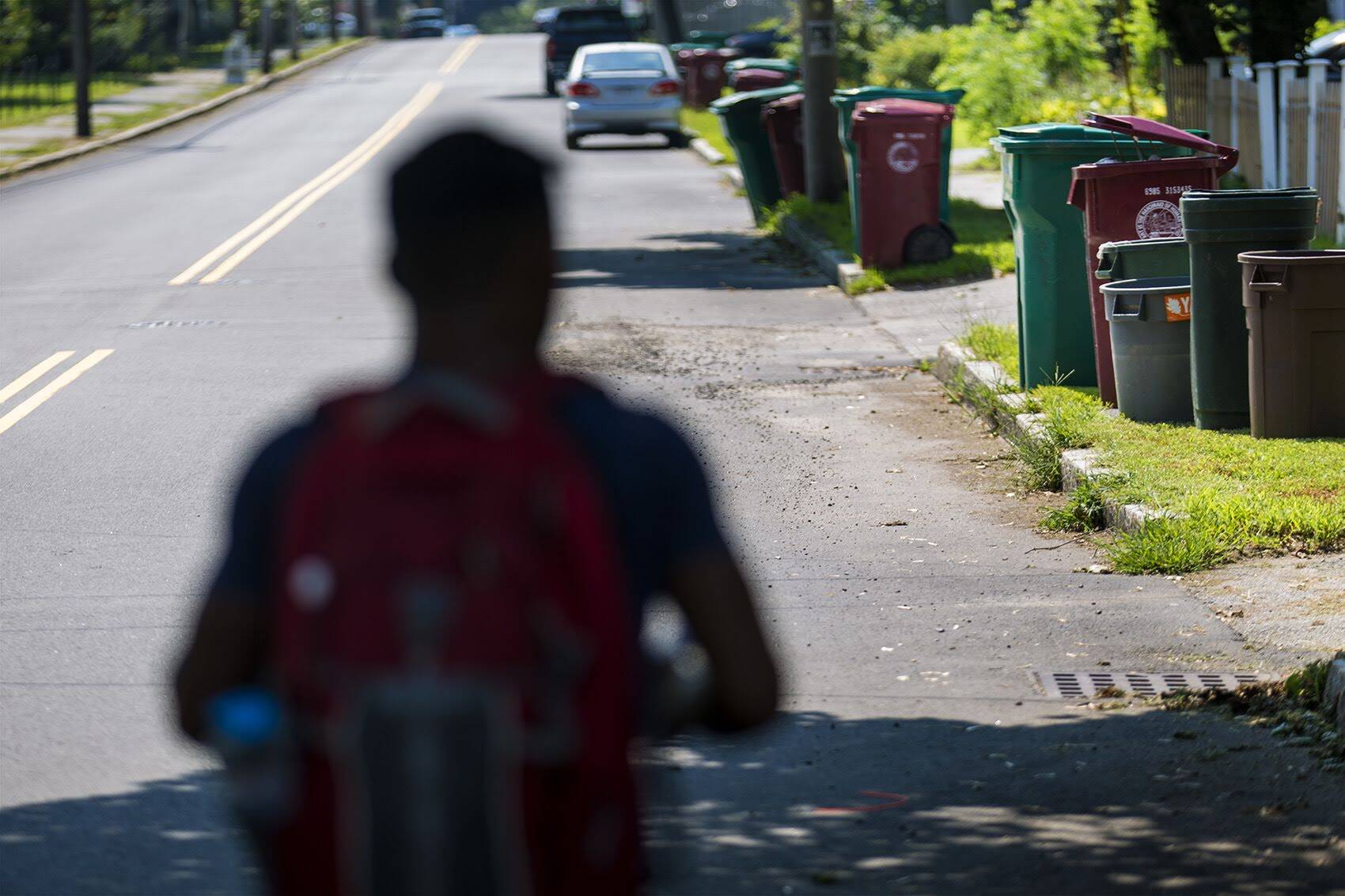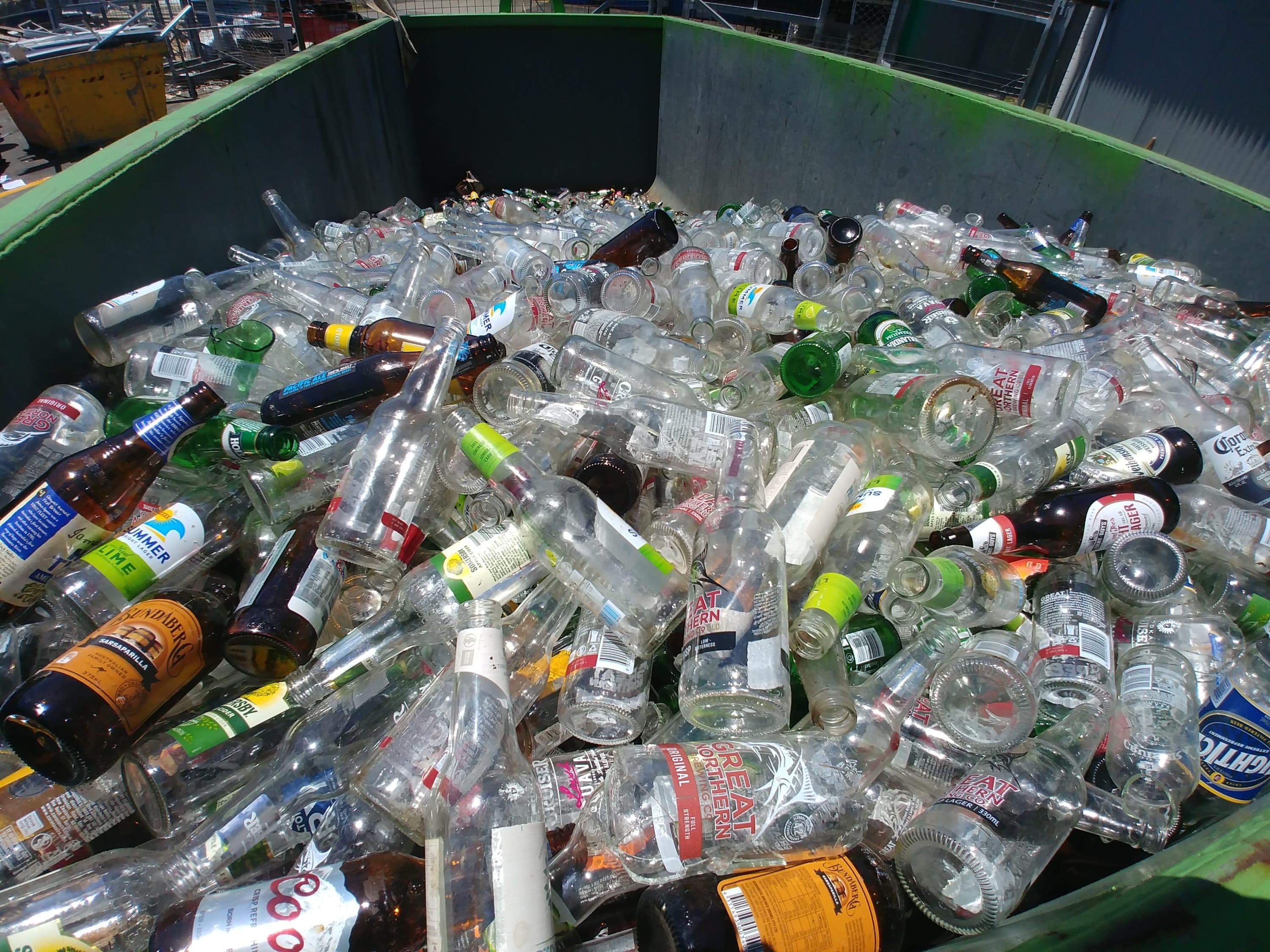Advertisement
What happens to the glass containers you think you’re recycling

Many Massachusetts residents put their glass bottles and jars in a recycling bin, along with the junk mail, plastics and aluminum cans, and assume that used glass will become new glass. That assumption is no longer accurate. A report out this week says that in Massachusetts, and most other states in the northeast, glass processed at recycling facilities is instead being used atop landfills to weigh down trash or as fill in construction projects.
It’s “the lowest value end use of recycled glass and it has the least environmental benefits,” said Mary Ann Remolador, assistant director of the nonprofit Northeast Recycling Council, which produced the report.
The problem: Glass that’s mixed with all your other recyclables gets contaminated with paper and grime, or shattered too finely. And there’s no place in Massachusetts that takes dirty, crushed glass.
The prospects for recycling glass are much better in towns where residents have to take their recyclables to a sorting station and separate the glass from other items. And bottles that are redeemed under the state’s bottle bill almost certainly become new glass or fiberglass.
But in at least 180 Massachusetts communities, including all the largest cities, residents put their recycling on the curb, in a single bin. This is known as single-stream recycling, and the state Department of Environmental Protection (DEP) said it has not significantly increased recycling rates. While single-stream has made collection more efficient and cheaper, the everything-in-one-bin system has complicated the picture for glass.
There was a time, not so long ago, when glass from your recycling bin became new bottles. A plant in Franklin used to clean it, separate the glass by color and sell it to a bottling factory in Milford. Both facilities closed in 2018. The bottle manufacturer cited a drop in demand for glass beer bottles.
It’s unclear if local demand for glass bottles will return, but other companies are considering new uses for that curbside-collected glass that’s sorted at material recycling facilities. One company has plans to use about 30% of the glass to make a lighter, more efficient type of construction fill. Aero Aggregates received a $200,000 grant from the state to help it open a facility in Massachusetts but hasn’t found a suitable location.
DEP says the state is also looking into the use of waste glass in concrete.
In the meantime, much of the state’s recycled glass is a substitute for gravel or dirt. Republic Services uses glass from its recycling plant in Peabody to cover the landfill there instead of soil. Casella, which operates two recycling facilities in Massachusetts, gives it to construction companies and municipalities for fill that replaces gravel. Casella spokesman Jeff Weld says that’s better than treating glass as trash.
“And at the same time, by turning it into something that’s eliminating the use of virgin natural resources, you’re preserving them for use in other ways,” Weld said.
Casella and some other recycling operators say they could clean and sort glass, but the report says trucking the heavy material more than 200 miles is not economically feasible, and there’s no place within that range to send the dirty glass. Recycling facilities in Massachusetts aren’t allowed to send glass to a landfill, so they often give the product away for free.
In nearly 150 towns, residents drop off and sort their glass and other recyclables, which means the glass is less contaminated. Some of those municipalities still elect to crush the glass for use in local road or construction projects. Other communities pay to have the sorted glass hauled away, cleaned and used for new bottles and jars — or in some cases, fiberglass. The glass still has to be processed because it might have the odd piece of ceramics, Pyrex or a candle in a jar container which can contaminate the melt for new glass.

“Paying $10 per ton to get rid of glass is great because we’re paying $117 per ton to landfill stuff,” says James Manzolini, the recycling superintendent in Wellesley, a town where residents sort their recyclables at a transfer station. “And the material will have a second life.”
There’s one, limited category of glass that virtually always finds a new life as glass. The beer, soda and mineral water bottles that get returned for a deposit are considered clean glass. They don’t get mixed with other materials so there’s little risk of contamination.
“Glass that is really source-separated is a sought-after commodity,” said Susan Collins, president of the Container Recycling Institute, which advocates for glass and other recycling. “The glass bottle-making facilities can’t get enough of it.”
But still, it appears there isn't enough demand for a plant to be successful in Massachusetts. Gretchen Carey, president of MassRecycle, says if residents want more robust glass recycling, they need to shop for more beverages in glass.
“That’s how it works, that closed loop: You buy it, you put it in the bin, and then buy it on the other end,” said Carey who is also the sustainability manager at Republic Services.
Whether it’s glass, plastic or cans, only about 38% of eligible containers are turned in for the deposit in Massachusetts. Several bills that would expand the state’s bottle deposit from 5 to 10 cents to encourage more returns had a hearing last month on Beacon Hill. The DEP is considering a plan that would add wine and other liquor bottles to the deposit program. The department says these make up 40% of glass containers, and recycling them would mean more discarded glass becomes new glass.
Using recycled glass to make glass is also better for the environment, according to an industry trade group, because it uses fewer raw materials, less energy and produces fewer carbon emissions.
Recycling advocates say they hope more attention to the state of glass recycling will help create more options.
“Everyone talks about plastics but it seems like almost no one knows that most glass is not getting recycled,” said Reagan Bissonnette, executive director of the Northeast Resource Recovery Association, a nonprofit that helps connect communities with companies that purchase recycled glass, paper, plastic and metal.
“It’s a real shame because it can get recycled,” she said.
Remolador, whose report highlights problems with glass at recycling facilities, sees two solutions. The facilities can upgrade their equipment or their processes, perhaps with financial assistance. DEP did recently give Casella $100,000 to improve glass sorting and cleaning.
“If the facility is unable to pull out glass early in their sorting line, communities should consider collecting glass separately,” she said.
A spokesman for the DEP says it would not be feasible for municipalities with single-stream recycling to process glass separately because it would be too expensive.
